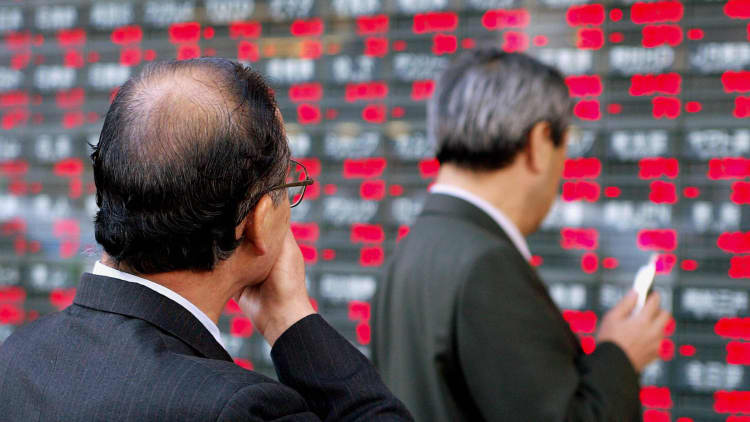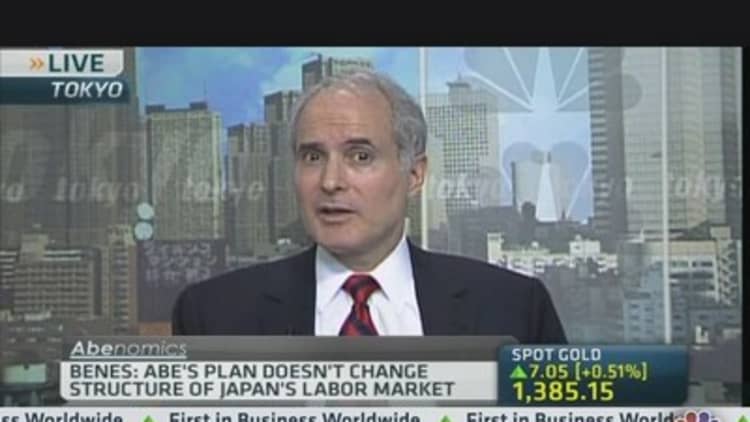The stampede out of Japanese equities resumed on Thursday, sending the benchmark tumbling as much as 6.4 percent.
Prime Minister Shinzo Abe's disappointing "third arrow" of long term economic reforms and the Bank of Japan's recent inaction to address bond market volatility is forcing investors to reassess their outlook for the country's stock market, said experts.
"Obviously, the three arrows that came out from Abe didn't really meet the mark. The expectation was really, really high, and he missed it," David Poh, regional head of asset allocation at Societe Generale Private Banking told CNBC on Thursday.
"At this moment, I'm a bit more cautious, it's not the time to go in, stick your hand out and catch a falling knife. It's best to sit on the sidelines and wait till after the July [upper house] election," Poh added.
(Read More: Are Markets Facing a Crisis of Confidence?)
Japan's high stakes elections for the upper house of parliament are scheduled for July 21. If Abe's Liberal Democratic Party (LDP) wins a majority in the upper house, it could make it much easier to pass through legislation, which strategists view as positive for the market.
Abe's three-pronged policy to boost growth started with monetary and fiscal stimulus, but the Prime Minister's recent announcement of his longer term growth strategy fell short of expectations. The Bank of Japan's nonchalance in addressing swings in the government bond market at its last policy meeting, has also led to market jitters.
"There are a lot of pieces which need to fall into place in the coming days and weeks in order to instill confidence in 'Abenomics'," said Nicholas Spiro, managing director of Spiro Sovereign Strategy.
(Read More: UBS Warns of 'Abegeddon' Risk in Japan)
"It's JGBs [Japanese government bonds] that are the ones to watch as the government needs the bond market to settle down in order for the banks to spearhead its growth strategy and, just as importantly, for fiscal credibility to be maintained," he added.
Recent strength in the Japanese yen, which is negative for the country's exporter stocks, has also helped fuel losses in the index.
The yen strengthened to a 10-week high on Thursday, rising 2 percent to around 94 against the greenback.

The Nikkei 225 has lost around 21 percent since May 22 - a day when the index came within a whisker of the key 16,000 level - placing it in bear market territory for the second time in less than a week. It fell to as low as 12,415 on Thursday before recovering to 12,445 at the end of the trading day.
Fast Money Trade
According to Glen Wood, head of sales, Global, Mitsubishi UFJ Morgan Stanley Securities, the selling is a result of traders taking some "fast money" off the table, noting that a move below 12,000 would force the market into "dangerous territory".
However, Wood said that he is positive on the market over the next 6-18 months, thus viewing the current sell-off as a buying opportunity.
"Japan is going through some radical changes, those changes have not stopped, things haven't reversed. It's full speed ahead. Has the timing been in line with market expectations maybe not? Have the specifics been there to support what investors were looking for? Probably not," Wood said.
(Read More: Japan Bear Market Gives Investors Bad Case of Déjà Vu)
"But we should know that's the way Japan operates. There is huge change going on in the government and Bank of Japan and that's not priced into the market," he said.
Within the next year and a half, Wood expects the market to touch 20,000 - almost 60 percent higher from current levels.
By CNBC's Ansuya Harjani



